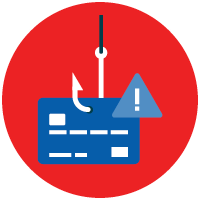
October 2024
Data Breach: A Savvy Guide to Protect Yourself and Your Data
What Happened?
On August 7, 2024, National Public Data, a database used by consumer public record sites, human resources, and staffing agencies, announced a “data security incident that may have involved some of your personal information.” This data breach exposed nearly 2.9 billion records including Social Security numbers, names, and other personal data.
National Public Data stated that they are working with government investigators and law enforcement to review the potentially affected records and “will try to notify” individuals if there are “further significant developments applicable to them.”
Read the full National Public Data “Security Incident” report here.
What Is a Data Breach?
A data breach is when personal information such as names, addresses, email accounts, passwords, and/or Social Security numbers are hacked or stolen.
Stolen data may or may not be used by cybercriminals for fraud or identity theft. If your Social Security number or other personal information was compromised in a data breach, it means your information is accessible to cybercriminals, but it doesn’t necessarily mean they will use it.
While you can’t stop theft from happening, you can take proactive steps to protect your identity and accounts. Here are some next steps you can take to check your information, protect your accounts, and prevent theft and fraud.
Check Your Social Security Number
To see if your Social Security number was part of the National Public Data breach, Pentester, a cybersecurity firm, has set up an easy online tool to check your information. Here’s how to access the tool:
- Go to npd.pentester.com.
- Enter your first and last name.
- Enter the state you live in.
- Add your birth year.
You’ll see a list of any breached accounts with leaked information, including the last four digits of the leaked Social Security numbers.
Monitor Your Credit Reports
One of the best ways to protect your information is to check your credit report regularly. Reviewing your credit report is the best way to spot inaccuracies, unusual activity, and fraud.
Set Up Fraud Alerts
A fraud alert is a note added to your credit file that you may be, or have potentially been, a victim of identity theft. It can be a good option if you’re concerned about identity theft but don’t want to limit a lender’s access to your credit report.
Check Statements
Monitor your credit card, investment accounts, and banking statements for suspicious activity, unexpected charges, or unauthorized transactions. Continue to be vigilant about checking your statements and keep an eye out for irregularities.
What Can I Do if My Social Security Number Is Stolen?
If you think your Social Security number has been stolen, contact the Federal Trade Commission at identitytheft.gov or 1-877-438-4337 and the Internal Revenue Service immediately.
What if I’m a Victim of Fraud?
If you suspect fraudulent or unauthorized transactions, take the following steps immediately:
- Contact the Company: Tell them your identity was stolen and you did not authorize the purchases.
- Talk to Your Financial Institution: Each financial institution has different procedures for fraud and theft, so let them know what happened and follow their instructions to resolve the issue.
- Freeze Your Credit: If you are concerned about unauthorized access to your credit file, you can request a credit freeze. Just remember to unfreeze your credit if you are applying for a new line of credit.
- TransUnion Credit Freeze
- Equifax Security Freeze
- Experian Freeze
Bottom Line
No one knows when a cyberattack or data breach will occur. The best way to protect yourself and your family is to be mindful of your online presence, proactively monitor your accounts, and set up alerts for additional security.
Cybercriminals will be vigilant in their efforts to steal and defraud. Staying ahead of them by being prepared secures your data and gives you the peace of mind you need.
Keep up to date on the latest fraud news by visiting bfcu.org.
Need to report card fraud?
Call 800-647-2328, option 6, or text 318-549-8145. Open Monday – Friday, 8:30 am – 5 pm.
After-hours debit card fraud, call 866-274-2761.
After-hours credit card fraud, call 800-543-5073.
800-647-2328
bfcu.org
Check Rates
Routing: 311175093

